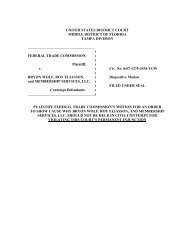HELO RCPT TO QUIT MAIL FROM DATA - Federal Trade Commission
HELO RCPT TO QUIT MAIL FROM DATA - Federal Trade Commission
HELO RCPT TO QUIT MAIL FROM DATA - Federal Trade Commission
Create successful ePaper yourself
Turn your PDF publications into a flip-book with our unique Google optimized e-Paper software.
<strong>Federal</strong> <strong>Trade</strong> <strong>Commission</strong><br />
as it is received.’ For example, an email could meet these requirements<br />
by the presence of an ADV: prefix on its subject line. 29<br />
Currently, we are aware of two countries – Japan and South Korea – that<br />
have enacted specific email labeling requirements applicable to a broad range of<br />
commercial email messages. In April 2002, Japan passed its “Law on Regulation<br />
of Transmission of Specified Electronic Mail.” Among other things, it requires<br />
UCE to be labeled in its subject line with five Japanese characters and a star that<br />
translates into “unsolicited email advertisement.” 30 In Japan, data suggests that<br />
spam did not decrease after its labeling requirements went into effect. 31<br />
Korea promulgated an anti-spam law in 2001 that requires that the term<br />
“ADV” in Korean characters be included in the subject line of UCE. 32 After<br />
finding that many spammers were labeling their messages using irregular<br />
characters, such as “A*D*V*,” the Korean legislature passed new measures in<br />
2002 that made such alterations illegal. 33 These measures also required that adultoriented<br />
commercial email be labeled “ADLT” in Korean characters. 34<br />
Because the amount of spam did not decrease, the Korean National Assembly<br />
revised the law in late 2002, and mandated that the “@” symbol also be included<br />
in the subject line of commercial email messages. 35 Although Korean government<br />
officials acknowledged that spam continued to increase under the prior law, we<br />
29. Spam, A Report of the All Party Internet Group 9, available at http://www.apig.org.uk/spam_<br />
report.pdf.<br />
30. Tokutei Denshi-Mail-no Soushin-no Tekisei-ka-tou-ni-kansuru Houritsu [Law on Regulation of<br />
Transmission of Specified Electronic Mail], Law No. 26, April 17, Year Heisei 14 (2002).<br />
31. The Current Status and the Future Task Regarding SPAM Mail, Ministry of Econ., <strong>Trade</strong>, and<br />
Indus. (“METI”), Dec. 6, 2004, at 9-10.<br />
32. See “The Act on Promotion of Information and Communication and Communications Network<br />
Utilization and Information Protection of 2001,” Article 50, cited in http://www.spamcop.or.kr/eng/m_2.html<br />
and Chung, Hyu-Bong, Anti-Spam Regulations in Korea, Korea Info. Sec. Agency (KISA), Apr. 15, 2003, at<br />
5, available at http://cauce.mail.daum.net/meeting/hbchung.doc.<br />
33. Chung, at 5.<br />
34. Id.<br />
35. “Because the methods or skills of the transmission of spam are increasingly becoming diversified<br />
technically, and since spammers typically disregard the seriousness of spam, the amount of spam did not<br />
decrease. For this reason, the National Assembly promulgated a revised Act . . . on December 18, 2002, to<br />
tighten control over spam.” See Korea Spam Response Center, Anti-Spam Activities in Korea, available<br />
at http://www.spamcop.or.kr/eng/m_2.html. This revised Act also established criminal penalties and raised<br />
existing fines.<br />
8

















